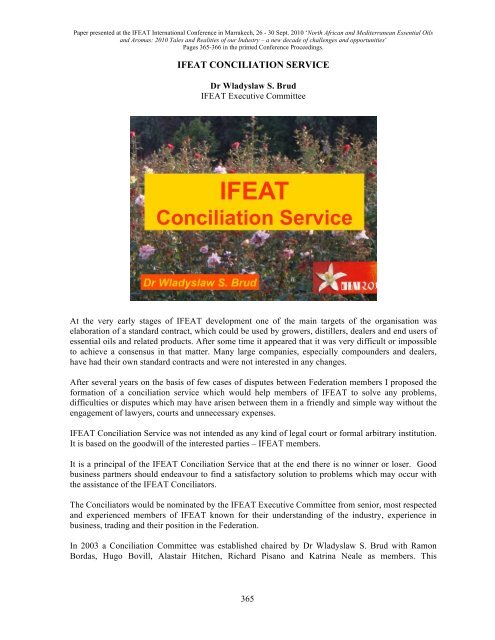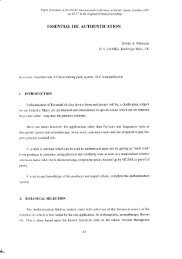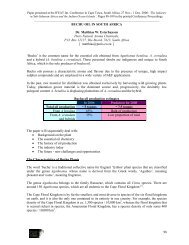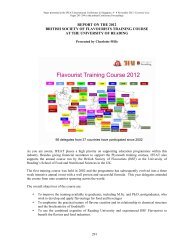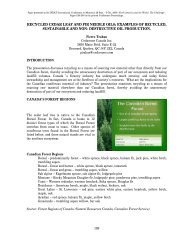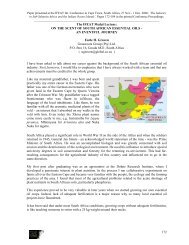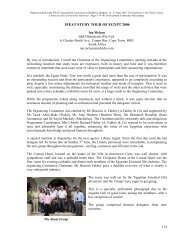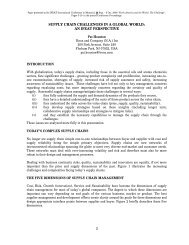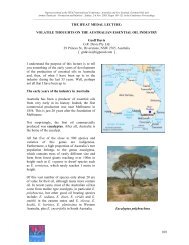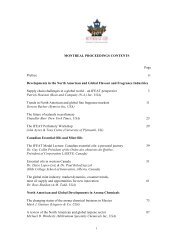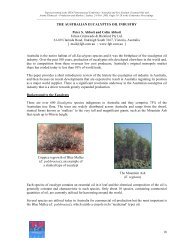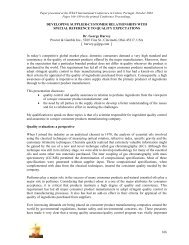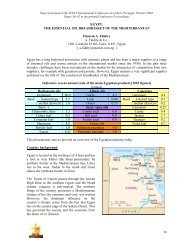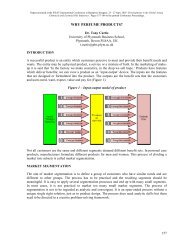IFEAT Conciliation
IFEAT Conciliation
IFEAT Conciliation
Create successful ePaper yourself
Turn your PDF publications into a flip-book with our unique Google optimized e-Paper software.
Paper presented at the <strong>IFEAT</strong> International Conference in Marrakech, 26 - 30 Sept. 2010 ‘North African and Mediterranean Essential Oils<br />
and Aromas: 2010 Tales and Realities of our Industry – a new decade of challenges and opportunities’<br />
Pages 365-366 in the printed Conference Proceedings.<br />
<strong>IFEAT</strong> CONCILIATION SERVICE<br />
Dr Wladyslaw S. Brud<br />
<strong>IFEAT</strong> Executive Committee<br />
At the very early stages of <strong>IFEAT</strong> development one of the main targets of the organisation was<br />
elaboration of a standard contract, which could be used by growers, distillers, dealers and end users of<br />
essential oils and related products. After some time it appeared that it was very difficult or impossible<br />
to achieve a consensus in that matter. Many large companies, especially compounders and dealers,<br />
have had their own standard contracts and were not interested in any changes.<br />
After several years on the basis of few cases of disputes between Federation members I proposed the<br />
formation of a conciliation service which would help members of <strong>IFEAT</strong> to solve any problems,<br />
difficulties or disputes which may have arisen between them in a friendly and simple way without the<br />
engagement of lawyers, courts and unnecessary expenses.<br />
<strong>IFEAT</strong> <strong>Conciliation</strong> Service was not intended as any kind of legal court or formal arbitrary institution.<br />
It is based on the goodwill of the interested parties – <strong>IFEAT</strong> members.<br />
It is a principal of the <strong>IFEAT</strong> <strong>Conciliation</strong> Service that at the end there is no winner or loser. Good<br />
business partners should endeavour to find a satisfactory solution to problems which may occur with<br />
the assistance of the <strong>IFEAT</strong> Conciliators.<br />
The Conciliators would be nominated by the <strong>IFEAT</strong> Executive Committee from senior, most respected<br />
and experienced members of <strong>IFEAT</strong> known for their understanding of the industry, experience in<br />
business, trading and their position in the Federation.<br />
In 2003 a <strong>Conciliation</strong> Committee was established chaired by Dr Wladyslaw S. Brud with Ramon<br />
Bordas, Hugo Bovill, Alastair Hitchen, Richard Pisano and Katrina Neale as members. This<br />
365
Committee would supervise and be responsible for maintaining the list of suitable members of the<br />
<strong>Conciliation</strong> Panel.<br />
Basic regulations were elaborated by myself and the Committee with the important help of Ron Neal.<br />
These were based on few simple rules:<br />
1. <strong>IFEAT</strong> will offer services of the Conciliators to <strong>IFEAT</strong> Members who need them.<br />
2. The Conciliator(s) once agreed by the parties will act on their own responsibility and by no<br />
means will represent or act on behalf of <strong>IFEAT</strong>. Also, they cannot be responsible for any<br />
possible consequences, financial and legal, which may appear as result of their conclusions<br />
and proposals.<br />
In other words, the idea of the <strong>Conciliation</strong> Service was to offer <strong>IFEAT</strong> members easily accessible,<br />
simple and a nearly no cost way of solving problems and disputes which are very often based on minor<br />
misunderstandings, inexperience and other unimportant reasons. The Conciliators, selected by<br />
interested parties from the above mentioned panel would use their experience to study the case and<br />
propose a solution that can be accepted by the adversaries. If that were impossible to achieve an<br />
agreement on this proposal then a standard arbitration or court would be a further way to solve the<br />
problem.<br />
Since its formation the <strong>Conciliation</strong> Committee was only engaged two or three times in members’<br />
disputes. In all those cases, when conciliation service was requested by one of the members, usually a<br />
simple letter to the other party resulted in very fast and amicable solution of the problem between the<br />
parties involved. It appeared that members preferred direct agreement without being involved in the<br />
procedure, which although fully confidential, could affect their image in <strong>IFEAT</strong>.<br />
Considering fundamental goals of the <strong>Conciliation</strong> Committee it is good for Federation when it is<br />
inactive and has no problems to solve. But it is there available for members to use in case of necessity.<br />
All rules and procedures of the <strong>Conciliation</strong> Committee are available on <strong>IFEAT</strong> Members web pages,<br />
and when members require conciliation the Chairman of the Committee can be approached via <strong>IFEAT</strong><br />
Secretariat.<br />
366


